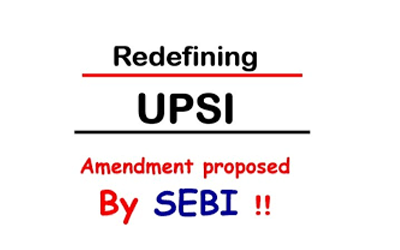Background:
Securities and Exchange Board of India (‘SEBI’) vide its consultation paper dt: May 18, 2023, and November 9, 2024, had proposed to align definition of Unpublished Price Sensitive Information (‘UPSI’) with list of material events / information as per schedule III of SEBI (Listing Obligations and Disclosure Requirements) regulation, 2015 [‘SEBI LODR’]. SEBI in its board meeting dt: December 18, 2024, approved amendment to definition of UPSI under SEBI (Prohibition of Insider Trading) regulation, 2015 [SEBI PIT’] to align with list of material event/ information as per schedule III of SEBI LODR.
Amendment:
SEBI vide its amendment notification dt: March 11, 2025, notified amendment to the definition of UPSI. With this amendment, now list of events or information provided under the definition of UPSI have increased to sixteen events / information. It means sixteen events or information, whenever they become generally available, may materially affect the price of securities of the company.
Now following events / information would be UPSI from June 9, 2025:
- Award or termination of order/contracts not in the normal course of business
- changes in key managerial personnel
., other than due to superannuation or end of term, and resignation of a Statutory Auditor or Secretarial Auditor - change in rating(s), other than ESG rating(s).
- fund raising proposed to be undertaken.
- agreements, by whatever name called, which may impact the management or control of the company.
- fraud or defaults by the company, its promoter, director, key managerial personnel, or subsidiary or arrest of key managerial personnel, promoter or director of the company, whether occurred within India or abroad.
- resolution plan/ restructuring or one time settlement in relation to loans/borrowings from banks/financial institutions.
- admission of winding-up petition filed by any party /creditors and admission of application by the Tribunal filed by the corporate applicant or financial creditors for initiation of corporate insolvency resolution process against the company as a corporate debtor, approval of resolution plan or rejection thereof under the Insolvency and Bankruptcy Code, 2016.
- initiation of forensic audit, by whatever name called, by the company or any other entity for detecting misstatement in financials, misappropriation/ siphoning or diversion of funds and receipt of final forensic audit report.
- action(s) initiated or orders passed within India or abroad, by any regulatory, statutory, enforcement authority or judicial body against the company or its directors, key managerial personnel, promoter or subsidiary, in relation to the company.
- outcome of any litigation(s) or dispute(s) which may have an impact on the company.
- giving of guarantees or indemnity or becoming surety, by whatever named called, for any third party, by the company not in the normal course of business.
- granting withdrawal, surrender, cancellation or suspension of key licenses or regulatory approvals.
SEBI has further guided that for the purpose of identification of events/ information as UPSI, the guidelines for materiality as specified under schedule III Part A of SEBI LODR shall be applicable.
Further SEBI has stated that ‘Fraud’ and ‘Default’ shall have the same meaning as they have been assigned under Schedule III, Part A, Para A, Point 6 of SEBI LODR.
Entry in Structured Digital Database and Trading window closure restrictions:
SEBI’s recent amendment has brought clarity to the timeline for making entries in the Structured Digital Database (SDD) for events or information originating from outside the listed entity. The timeline for recording information in the SDD is as soon as a designated person comes into possession of UPSI or he/she shares UPSI. However, with the new regulation, SEBI has mandated that any information not originating from within the organization must be entered into the SDD within two calendar days from the date of receipt.
Removal of restriction on Trading window closure:
As per SEBI PIT, trading window closure is mandatory when designated persons are in possession of UPSI. However, SEBI has relaxed this provision for certain corporate actions and now further clarifies that trading window closure may not be necessary for UPSI that originates from outside the listed entity. Consequently, Compliance Officers must distinguish between UPSI generated within the organization and that originating from external sources, to determine whether trading window closure is required?
Further Write up / FAQs on this amendment will follow soon.
SEBI PIT amendment can be accessed at below link.

